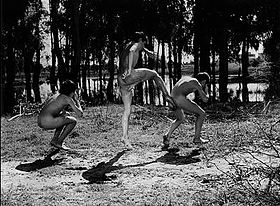Crónica de un niño solo
| Movie | |
|---|---|
| Original title | Crónica de un niño solo |
| Country of production | Argentina |
| original language | Río de la Plata Spanish |
| Publishing year | 1965 |
| length | 79 minutes |
| Rod | |
| Director | Leonardo Favio |
| script | Leonardo Favio, Jorge Zuhair Jury |
| production | Luis DeStefano |
| music |
Arcángelo Corelli , Alessandro Marcello |
| camera | Ignacio Souto |
| cut |
Antonio Ripoll , Gerardo Rinaldi |
| occupation | |
| |
Crónica de un niño solo ("Chronicle of a Lonely Child") is an Argentine film from 1964 and as such the first work by director Leonardo Favio . Diego Puente took on the leading role . The black and white film was shown for the first time on May 5, 1965, in 1966 it was awarded the Cóndor de Plata and in 1965 at the Festival Internacional de Cine de Mar del Plata . Crónica de un niño solo is considered a classic in Argentine film history.
action
The film shows the experiences of Polín, a boy who was deported to an educational institution. Polín flees from the violence prevailing in the home and spends a few hours in freedom in the slums of the metropolis of Buenos Aires , by a river, before he is picked up again.
background
The film is considered to be a late work and a highlight within the Argentine trend of the nuevo cine ("new cinema").
Crónica de un niño solo is Leonardo Favio's feature film debut, made in the brief era of Illias , which, like Políns tearing away in the film, can be understood as a fermata. The film is partly autobiographical and part one of a trilogy that Favio completed with Este es el romance del Aniceto y la Francisca, de cómo quedó trunco, comenzó la tristeza y unas pocas cosas más… (1966) and El dependiente (1969).
In the cut, planned sequences predominate , music is only subordinate to the film in four scenes.
In Argentina, the film was banned for many years after its release due to its portrayal of corruption and violence in a state-run children's home. Today it is released in Argentina from the age of 18.
criticism
RosarioCine.com.ar pays tribute to the film with the words “ sensible y con una poética desgarradora, construye una historia que aún conmueve profundamente y la mantienen como uno de los más señeros y valorables filmes de la historia del cine nacional ” (German: “sensibel and with a harrowing poetics, [Leonardo Favio] creates a story that is still profoundly moving and they consider it one of the most unique and valuable films in national cinema ”).
According to the Argentine film critic David Oubiña , Favio succeeded “ to articulate certain European New Wave influences within the framework of a personal aesthetic that demolished the barrier separating high culture from art ” (German: “Certain European New Wave influences within the framework of a personal To articulate the aesthetic that destroyed the barrier between high culture and art ”).
According to Tim Barnard, Crónica is a juvenile universe that is only briefly disturbed by adults.
Awards
- Festival Internacional de Cine de Mar del Plata 1965: FIPRESCI Prize
- Premios Cóndor de Plata 1966: Cóndor de Plata (best film)
Web links
- Chronicle of a Boy Alone in the Internet Movie Database (English)
- Crónica de un niño solo . cinenacional.com
Individual evidence
- ^ Crónica de un niño solo . filmaffinity.com
- ↑ a b c d Tim Barnard, Peter Rist: South American cinema: a critical filmography, 1915–1994 . University of Texas Press, 1998, ISBN 0-292-70871-8 , pp. 42f
- ^ Olaf Möller: … vi tu desolacion / de niño acorralado. With Leonardo Fabio through half a century of Argentine (film) history. In: Daniela Ingruber, Ursula Prutsch (Ed.): Films in Argentina. Argentine Cinema . LIT Verlag, 2012, ISBN 3-643-50415-2 , p. 59.
- ↑ Chronicle of a Boy Alone (Crónica de un niño solo) . heiners-filmseiten.de
- ↑ Cronica de un niño solo . rosariocine.com.ar
- ↑ David Oubiña: Pop rebel: Argentina's flamboyant movie maverick finds the poetic within the populist - Leonardo Favio
